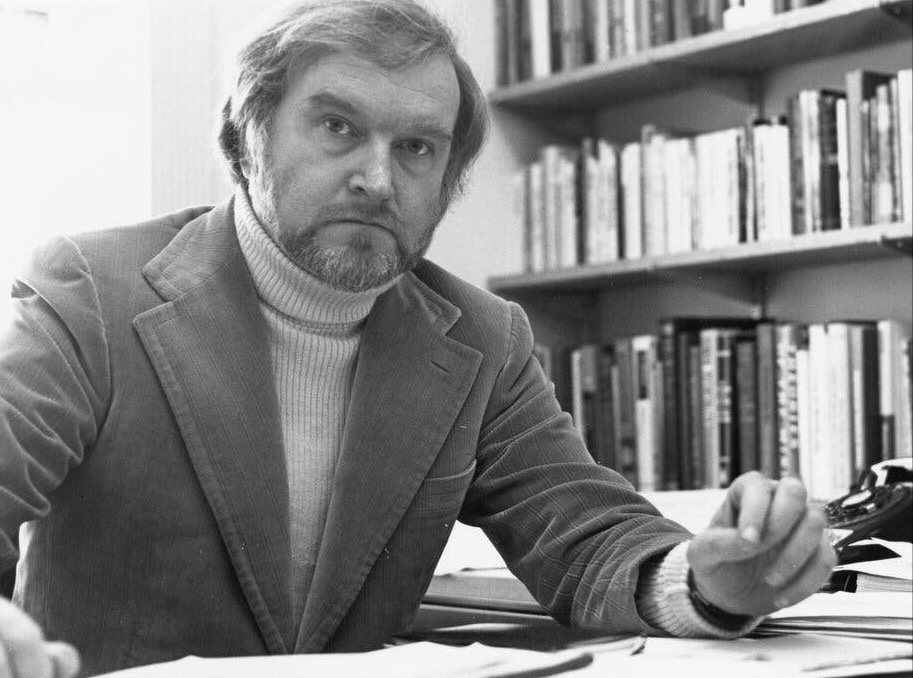Positive Flow In Action
The field's originator, the author, psychologist and rock climber Dr. Mihaly Csikszentmihalyi. Photo by Steve Strandberg, The Chicago Maroon.
The Healing Insights Of Mihaly Csikszentmihalyi Lives In Our Hearts
“Happiness is not a destination where you arrive, but a condition that needs to be cultivated.”
—M. Csikszentmihalyi, Flow
The idea that an engrossing and challenging experience can yield enjoyment and fulfillment, while improving mental health, is essential to what today is called “flow science.” The field's originator, the author, psychologist and rock climber Dr. Mihaly Csikszentmihalyi (pronounced me-HIGH CHEEK-sent-me-HIGH), died on October 10, 2021.
"Flow" is at the heart of our 4Roots Wellness approach and our concept of embodied peak experience, in which we use the challenges of outdoor adventure and nature exploration to help build personal resiliency and improve mental health and well-being. Our gratitude for Dr. Csikszentmihalyi’s momentous contribution—for the impact of his life’s work on ours—is immense. We mourn his passing.
What, Exactly, Is Flow?
In a New York Times review of Csikszentmihalyi’s groundbreaking 1990 book, Flow: The Psychology of Optimal Experience (HarperCollins, 2008), Carol Tavris summarized flow as “the state of involved enchantment that lies between boredom and anxiety.”
A person in flow, she wrote, “is mentally involved in the challenge and intrinsic pleasure of the activity (and hence is not bored), yet lacks self-consciousness and apprehension about performance (the hallmarks of anxiety).”
Tavris concluded, “Flow doesn't require education, income, high intelligence, good health or a spouse. It requires a mind: one that is willing to set challenges for itself and make the effort to meet them. In this respect, flow is another part of the cognitive revolution in psychology and psychotherapy: as scores of studies are finding, it is not so much what happens to people but how they interpret and explain what happens to them that determines their emotional well-being, their actions, their hopes, their ability to recover from adversity.”
Flow’s Far-Reaching Impact
As Matt Schudel wrote in The Washington Post following Csikszentmihalyi’s death, the book “became a bestseller and has been translated into more than 20 languages. It was cited as a favorite book by business leaders, President Bill Clinton, British Prime Minister Tony Blair and Dallas Cowboys coach Jimmy Johnson, who held up a copy after the 1993 Super Bowl and said, ‘My team has won because of this book.’"
“I was astonished to find that all those different people—rock climbers, basketball and hockey players, dancers, composers, chess masters—used very similar terms to describe their activities and the reasons they got so much out of them,” Csikszentmihalyi told the Chicago Tribune in 1986. “They were describing it in terms of focusing of attention, the disappearance of self, the disappearance of the sense of time, the clarity of goals, the clarity of feedback."
Whether making music, ice skating, writing a book, performing surgery or preparing food, these people became “completely involved in an activity for its own sake,” Csikszentmihalyi told Wired magazine in 1996. “The ego falls away. Time flies. Every action, movement, and thought follows inevitably from the previous one, like playing jazz. Your whole being is involved, and you’re using your skills to the utmost.”
“I call it the flow experience," said Csikszentmihalyi, "because the people frequently used ‘flow’ in describing how they felt.”
Csikszentmihalyi’s 2004 TED Talk about the concept of flow has been watched more than 6 million times.
The Transition to "Positive Psychology" and Positive Outcomes
Explaining how the flow principle built on earlier innovations by psychologist Abraham Maslow, Schudel noted, “His academic pursuits helped make Professor Csikszentmihalyi a founder of a new branch of study called positive psychology, exploring optimal experiences, creativity and joy. When he began his career, academic psychology focused largely on misery and abnormal behavior.” Like Maslow, Csikszentmihalyi did not subscribe to the treatment of people as a “bag of symptoms.”
The first major iteration of his framework for the study of positive states, Beyond Boredom and Anxiety, was published in 1975. His commitment to individual creativity and potential in face of fundamentally dehumanizing and developmentally debilitating societal problems were a clarion call for a large community that continues to grow.
Actively scanning various domains of human experience in which Csikszentmihalyi’s insights can be applied, advocates are "getting in the flow" in areas ranging from business and education to art and mental health.
Organizations like The Flow Research Collective implement specific insights to improve performance in business, sports, and science, to transcend limits and make substantial breakthroughs.
At Gateway Mountain Center (GMC), we apply Csikszentmihalyi's work in our ongoing development of techniques that rely on challenging outdoor and nature-based experiences as tools for activating resilience and improving mental health and well-being. Our efforts are directed toward the mental health and developmental needs of youth in particular, with a clear orientation toward activating students’ positive potential.
A growing body of research in the fields of neuroscience and trauma recovery are corroborating the first-hand experience we’ve had over the past fifteen years.
A 2016 article included in the book Flow Experience: Empirical Research and Applications (Springer, 2016), “The Flow Experience in Clinical Settings: Applications in Psychotherapy and Mental Health Rehabilitation,” concluded that “the ability to find flow in everyday life was connected with individuals’ well-being and reduced symptomatology. Results also suggested a relationship between flow and psychotherapeutic intervention.” Finding flow, they wrote, “fosters positive and meaningful changes both inside and outside the therapeutic and rehabilitation processes.”
Our own data and collaborations with researchers are likewise substantiating the efficacy and positive outcomes of nature-based therapeutic flow states. Through appropriate levels of challenge that help them drop into the zone, we see students' build confidence and increase both their ability to self-regulate and their relational awareness. We also see them step into a learning and growth mindset that further contributes to their resilience over the long term.
Another key leader in the science of flow is the Quality of Life Research Center at Claremont Graduate University in Southern California (which Csikszentmihalyi helped found).
Outdoor Adventure and Rock Climbing—a Key Point of Origin for Flow
Outdoor experiences, especially rock climbing, were formative for the world-famous psychologist and his ideas. His impact on the climbing community has, in turn, been profound.
His family deeply affected by the trauma of WWII, Csikszentmihalyi first accessed an immersive mindstate through climbing and saw it as catalyzing his own much-needed personal development as a young man.
His time exploring and supporting himself through work at ski resorts in the Swiss Alps also happened to coincide with another encounter that influenced his career trajectory and intellectual evolution. A shortage of snow made work scarce, leaving him broke. With time on his hands, he attended a free lecture that turned out to be given by celebrated psychologist Carl Jung. Motivated by what he heard, Csikszentmihalyi became an enthusiastic reader of psychology texts. Soon he found his way to the United States to study the subject, earning his doctorate in 1965 from the University of Chicago. He taught there for many years before relocating to Claremont Graduate University.
In a recently published reflection in Climbing magazine, our founder and executive director, Peter Mayfield, wrote of Csikszentmihalyi’s contribution to rock climbing: “Many climbers I know have appreciated the book Flow, for describing a familiar state.” Mayfield went on to quote from the book: “The mystique of rock climbing is climbing; you get to the top of a rock glad it’s over but really wish it would go on forever. The justification of climbing is climbing.”
Csikszentmihalyi’s son Chris, a climber himself, noted that the significance of his father's “experiences of enjoyable concentration in rock climbing, chess and painting were largely ignored in psychology and psychotherapy...” due to the limitations of the field’s focus on negative pathologies.
Embodied Peak Experience at GMC: Flow in Action
At GMC, we variously use climbing and rugged terrain (such as logs suspended across creeks and talus fields, and also built structures in urban settings) to support youth in accessing the optimal zone of challenge, to reach what we call embodied peak experience. Navigating surfaces and structures that present an appropriate level of challenge—the balancing actions and the awareness of both self and the environment that is required—develops capacity for coordination, focus, and healthy equilibrium between intero- and exteroception.
As emerging research in the field of neuroscience and trauma recovery is further confirming, these very kinds of activities also activate pathways in the brain that are specifically associated with a strong sense of self, emotional regulation and relational awareness. Whether too much screen time is creating imbalance, or if students are experiencing either low levels of anxiety at one end of the spectrum or complex trauma on the other, our work is committed to supporting their capacity to move through the world with resilience and meaningful purpose, to come into more meaningful contact in their relationships, and to discover the kind of wonder and curiosity that can spark a lifelong desire for learning and growth.
Abraham Maslow, pioneer of “positive psychology,” emphasized “peak experiences” in which love, gratification, happiness, understanding, and creativity emerged. Csikszentmihalyi stood on Maslow's shoulders in developing his flow concept, and the idea of embodied peak experience, as we practice it at GMC, reflects the work of both of these giants.
Learn more about flow in action in GMC’s programs—Whole Hearts, Minds & Bodies, 4Roots Wellness, Sierra Experience—and on our Wellness channel.
The Eight Characteristics Of Flow According To Mihaly Csikszentmihalyi
Complete concentration on the task.
Clarity of goals and reward in mind and immediate feedback.
Transformation of time (speeding up/slowing down).
The experience is intrinsically rewarding.
Effortlessness and ease.
There is a balance between challenge and skills.
Actions and awareness are merged, losing self-conscious rumination.
There is a feeling of control over the task.

